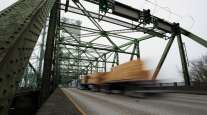States Ask Voters to Decide on Infrastructure Measures
This story appears in the Nov. 3 print edition of Transport Topics.
Transportation advocates are increasingly taking their case for better infrastructure to the public, a strategy magnified in a number of states as voters head to the polls Nov. 4.
With Congress and state officials less willing to seriously address critical funding needs, truckers and other business groups are stepping up to prioritize road spending, and to protect revenues already being generated by fuel taxes and vehicle registration fees.
In Maryland and Wisconsin, for example, voters are being asked to put a lock on the money that flows into their state funds.
And in Texas, flush with tax revenues from the booming oil and gas industry, truckers lead the campaign for a ballot measure that, if approved this week, will divert to roads billions of dollars stashed in the state’s rainy- day fund.
“It’s sitting there,” said John Esparza, president of the Texas Trucking Association. “We’re not asking for a new tax. We’re saying, ‘We’re collecting so much in existing tax that we need your permission to repurpose it constitutionally.’ ”
The amendment would allow Texas to spend an additional $1.7 billion annually on its congested, deteriorated road system, Esparza said.
As in most states across the country, however, even that sum won’t meet the need. An estimated $5 billion more is needed annually to maintain and improve the existing system.
Meanwhile, in Wisconsin, truckers are actively supporting a proposed constitutional amendment on the ballot that would bar using transportation money for any other purpose but roads.
“The idea is to protect the transportation fund from being raided by future legislatures and governors,” said Neal Kedzie, president of the Wisconsin Motor Carriers Association.“It crosses party lines,” he said of the ballot measure. “This is about doing the right thing, especially since we all appreciate the fact that our . . . highway system is essential to the economy and people like to have good roads.”
The state transportation fund has a projected shortfall of about $680 million over the next two years.
But with such strong anti-tax feelings hanging over the country, before public officials venture to ask voters to pay higher taxes to cover the shortfall, there has to be constitutional assurance that any new revenue will be spent on roads, Kedzie said.
In Maryland, truckers also are backing a ballot measure they say would prevent poaching in the transportation fund, although that state is luckier than most. Maryland’s transportation fund is expected to receive $4.4 billion more over the next six years because officials there last year were persuaded to approve new fuel and sales taxes.
“We’re enthusiastically supportive,” said Louis Campion, president of the Maryland Motor Truck Association, which is part of a coalition of business and labor groups working to get the measure passed.
“If we’re asking the citizens to pay more in gas taxes or other transportation fees, which we are, then we ought to affirm to them that we are going to use those for transportation purposes,” he said.
Still the backlash against taxes is strong, as evidenced by a group in Massachusetts, the Committee to Tank Automatic Gas Tax Hike, that put a measure on the ballot to repeal a key part of the transportation funding plan approved last year.
The measure would eliminate the annual indexing of the state gasoline tax to the consumer price index.
Louisiana transportation advocates are backing a ballot measure that would allow the state to create an infrastructure bank.
“We’ve got congestion needs; we’ve got maintenance needs,” campaign spokesman Mark Lambert said.
Local governments would be able to borrow money at low interest rates from the bank, Lambert said, adding that funding for the bank is not included in the ballot measure and would have to be devised later.
Nevada truckers are working against a measure that they said would result in large tax burdens.
The proposed “margin tax,” as it is called, would generate money for education by imposing a 2% tax on the gross income of companies with more than $1 million in receipts, said Paul Enos, CEO of the Nevada Motor Transport Association.
“It’s actually worse than a corporate income tax in that regard, because you could lose money, and you’re still going to have to pay this tax if this thing passes,” Enos said. “We don’t have high profit margins. The average trucking company profit margin is about 3%.”
Enos also said that, according to data from the Internal Revenue Service, in 2010, when Nevada carriers were reeling from the recession, they had an average profit margin of 2%. If the proposed tax were in place that year, it would have been the equivalent of a 75% income tax rate.




